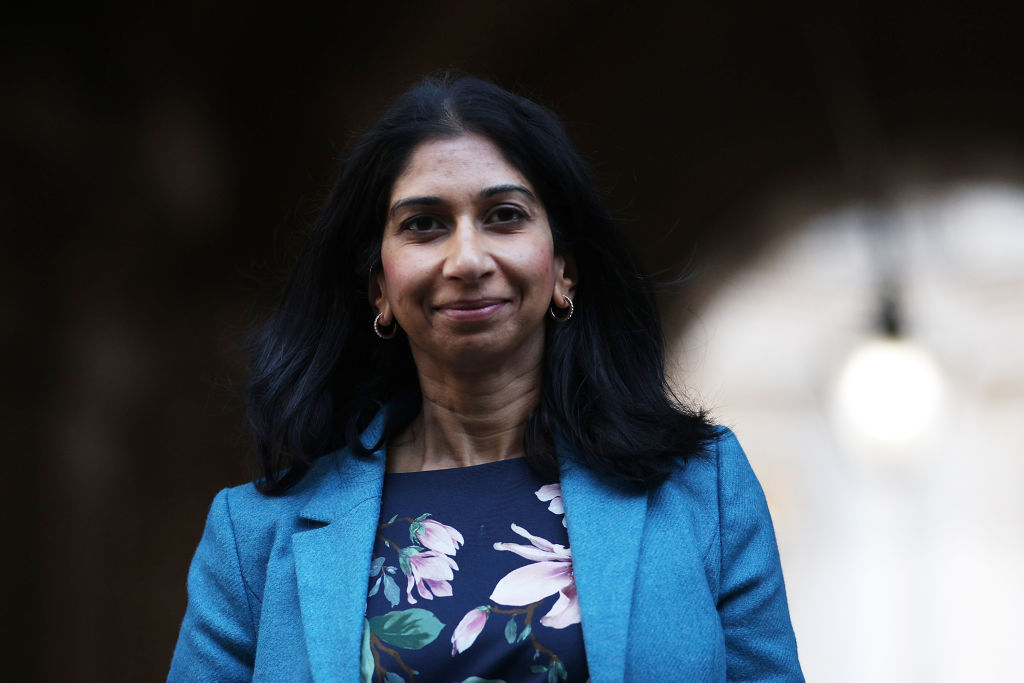It’s easy to see the thinking behind Suella Braverman’s plan announced in Manchester today to prevent sex offenders changing their name. In a country without ID cards or universal means of identification, it is fairly easy discreetly to disappear if you are at the margins of society, and possibly even to find a way of claiming at least some form of social security. This obviously defeats much of the object of having a sex offenders’ register, since it can in too many cases reduce the official record to something more like Gogol’s rentroll of dead souls.
True, it is already technically a crime for anyone on the register not to tell the police of any change of name, address, or other details. But enforcement can be tricky: in the year to March 2022 some 30 sex offenders a week were prosecuted or cautioned for omitting to do this, and it is a racing certainty that a great many more have quietly vanished from sight without being caught.
The Braverman plan has the advantage of at least making disappearing acts slightly more difficult, by doing something that should have been done long ago: integrating the offenders’ register with other departments such as the Passport Office, the Department for Work and Pensions and the Inland Revenue and thus increasing the chance that any surreptitious name-changes are picked up and passed on. It also promises to encourage extra vigilance from all these departments when they are asked to register an account for someone with a suspicious lack of history or a large hole in their CV.
For this we must be grateful. But will the effect be more than marginal, however? Despite the fact that this move is superficially popular and seems to have cross-party support – for example, it was immediately welcomed by Labour’s Sarah Champion – there is considerable room for doubt.
For one thing, many changes of name are informal. England is unusual in Europe in that as far as the strict law is concerned, a person over 16 is entitled to call themselves what they like without asking permission from anybody, or telling anyone in authority. Furthermore, it is possible to do this semi-formally by executing a deed poll (which means in effect a simple declaration) in front of two witnesses stating that one is changing one’s name. While one can have this officially registered if prepared to pay £42.44, a measure that that makes it more acceptable in practice to banks and other organisations, there is no requirement to do so.
For a registered sex offender, however, it is already illegal to do any of these things without immediately telling the police. One might have thought that prohibiting them from doing so even if they did notify the local station sergeant added rather little: indeed, it might have the perverse effect of driving yet more changes of identity underground.
Secondly, it is hard to see that this change will add very much to the protection of the rest of us. As it is, the public has no access to the sex offenders’ register; this is strictly limited to the police, who will pass on information at their discretion to those, such as neighbours, whom they consider to be at risk and able to be trusted with the knowledge. Allowing an offender to change his name provided he notifies the police, as we do at present, leaves the process intact: the neighbour will simply receive details of the new name rather than the old. Banning such changes, by contrast, will if anything cause confusion. There is little the authorities can do in practice about someone informally starting to using a different name: as a result, one suspects that an outright bar on changes of name may well, ironically, lead to the dissemination of yet more inaccurate and outdated information.
Is there anything further that could be done about the sex offenders’ register, to make it more effective?
Thirdly, for all the headline-grabbing there will presumably have to be exceptions. Even the government recognises that, for example, name changes for religious reasons or following a conscientious decision to change gender would probably have to be allowed under the present human rights regime.
Is there anything further that could be done about the sex offenders’ register, to make it more effective? One possibility would be to make it open to anyone to inspect, as is the case in some US states. This would have the advantage of improving the protection of the public, and possibly also of helping to keep the register up to date through individuals reporting their suspicions of unauthorised name changes. But this would not only run counter to the tendency of UK public authorities to keep as much information out of the public’s hands: it would probably also infringe the human rights of offenders, who might find both their privacy and their safety imperilled. Of course, there is a possible cure for the human rights point too: but we can leave that argument to another occasion.






Comments